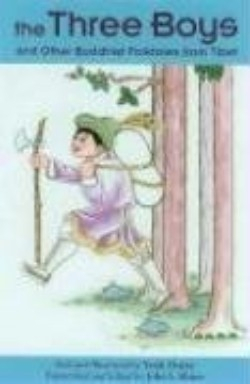The Three Boys and Other Buddhist Folktales from Tibet
This delightful book of folktales is the product of a very successful collaboration. The illustrator, born in 1960, began life in exile in Bhutan, and from an early age yearned for his lost homeland of Tibet. In 1969, he moved to Karnataka, India, and in 1970 entered the Gyudmed Tantric University. In 1995 he emerged with the equivalent of a doctorate. He had eagerly absorbed folktales told by older Tibetan monks, seeing the stories as a valuable repository of Tibetan Buddhist tradition. As Scholar in Residence at a Buddhist center near Los Angeles, he met the editor, a distinguished specialist in Asian literature. Dorjee recounted more than a dozen stories to Major—and readers are fortunate to have them in this attractive edition, complete with Dorjee’s line drawings.
These tales are full-blooded: corpse-monsters, shape-shifters, and cannibals make their appearance; the form transcends the “Once-upon-a-time, wandering-orphan, dark-forest, wicked-bandits, beautiful-maiden, lived-happily-ever-after” tradition. They teach the ideals of courage, perseverance, fidelity, and virtue—and show that wickedness is punished and virtue rewarded, while telling readers much about how Tibetans live, work, dress, and eat. The stories also emphasize the Buddhist virtues of mindfulness and compassion.
They can be extremely pointed, as is “The Carpenter Who Went to Heaven,” in which a house painter in disguise persuades the king that his royal father is building a heavenly palace and needs a carpenter (the colleague of whom he is jealous) to ascend on the smoke of a pyre and provide help. The carpenter, no fool, appears to accede. He deftly avoids incineration and later returns, advising the king that the new palace needs painting. The king commands the painter to provide his services, “traveling” via pyre. He unhappily ascends in smoke and as smoke. In the touching story “Penba and Dawa,” infidelity is only a dream event, but nonetheless imagined guilt leads to an actual and embarrassed confession.
Seven longer stories are part of a cycle dealing with perseverance and mindfulness; in each, an engaging (if lightly didactic) story-within-the-story leads the persevering protagonist to become momentarily unmindful—and find himself back at square one of his quest. Among these is the eventful title story, “The Three Boys.”
Tibetan traditions come to life in these stories, and Major’s notes on the stories and where they can be found in their written forms add to the value and reward of these transcriptions of Yeshi Dorjee’s retellings.
Reviewed by
Peter Skinner
Disclosure: This article is not an endorsement, but a review. The publisher of this book provided free copies of the book to have their book reviewed by a professional reviewer. No fee was paid by the publisher for this review. Foreword Reviews only recommends books that we love. Foreword Magazine, Inc. is disclosing this in accordance with the Federal Trade Commission’s 16 CFR, Part 255.

